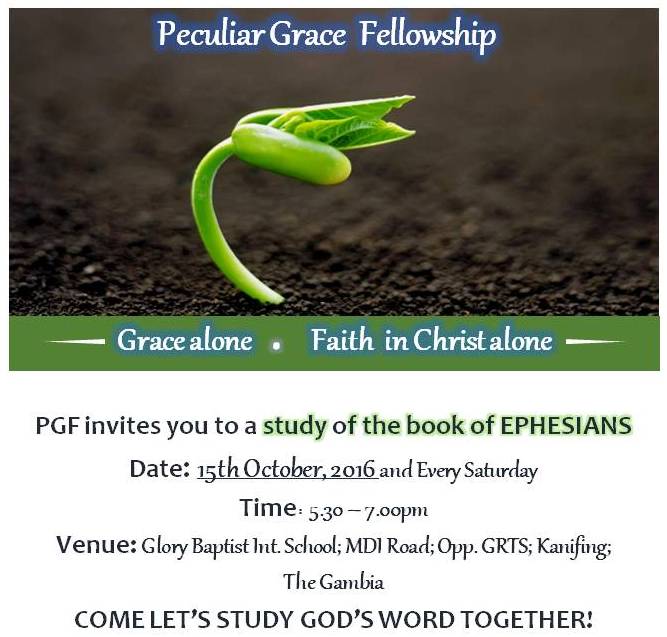
In January this year, I read a book by John Piper called Providence. In it, he shows that the pervasive theme of all that God does in redemptive history is that God be known, enjoyed, and praised for who He really is.
My three takes from Piper’s book were: 1) a God-saturated, scripturally-informed and God-entranced worldview of God’s providence (which Piper defines as purposeful sovereignty) in redemptive history; 2) a seeing and savouring of God’s providence in suffering and sanctification and indeed every aspect of the life of the believer; and 3) a deep appreciation of God’s ultimate purpose for all He does in redemptive history, namely that He be known and enjoyed for who He truly is.
This third point, in particular, was truly eye-opening and life-changing for me! In this article, I would like to briefly expound on this and offer some practical applications and implications of this truth for the Christian life.
We can’t know and trust the Biblical God if we don’t understand what Scripture says about Him, from Genesis to Revelation.
The answer to the first question of the Westminster Shorter Catechism states that man’s primary purpose is to glorify God and to enjoy Him forever. In his book, Piper draws out the connection between glorifying God and enjoying Him by pointing out how praise and joy go together. C. S. Lewis observed that praise is the consummation of joy. In his work, ‘Reflection on the Psalms’, he aptly notes:
“The most obvious fact about praise—whether of God or anything—strangely escaped me. I thought of it in terms of compliment, approval or the giving of honour. I had never noticed that all enjoyment spontaneously overflows into praise—lovers praising their mistresses, readers their favourite poet, walkers praising the countryside, players praising their favourite game—praise of weather, wines, dishes, actors, horses, colleges, countries, historical personages, children, flowers, mountains, rare stamps, rare beetles, even sometimes politicians and scholars.
My whole, more general difficulty about the praise of God depended on my absurdly denying us, as regards the supremely Valuable, what we delight to do, what indeed we can’t help doing about everything else we value.
I think we delight to praise what we enjoy because the praise not merely expresses but completes the enjoyment; it is its appointed consummation. It is not out of compliment that lovers keep on telling one another how beautiful they are; the delight is incomplete till it is expressed.”
Simply put, you cannot enjoy a God you don’t know, nor will you delight in glorifying Him.
The Holy Spirit implants a genuine and fresh appreciation of God’s beauty in our hearts at regeneration
As a result of our fallen condition, we don’t desire God, let alone love or enjoy Him. We wish he didn’t exist so that we wouldn’t have to be accountable to Him. And so, in salvation, the first thing God does is to give us a new heart—which feels the true preciousness and beauty and pleasantness of God’s holy name and all His attributes—and put His Spirit in this new heart, so that we can truly know (intimately, fully appreciate and grasp) and savour the beauty of Jesus:
31“Behold, the days are coming, declares the Lord, when I will make a new covenant with the house of Israel and the house of Judah, 32 not like the covenant that I made with their fathers on the day when I took them by the hand to bring them out of the land of Egypt, my covenant that they broke, though I was their husband, declares the Lord. 33 For this is the covenant that I will make with the house of Israel after those days, declares the Lord: I will put my law within them, and I will write it on their hearts. And I will be their God, and they shall be my people. 34 And no longer shall each one teach his neighbor and each his brother, saying, ‘Know the Lord,’ for they shall all know me, from the least of them to the greatest, declares the Lord. For I will forgive their iniquity, and I will remember their sin no more.” (Jeremiah 31:31-34; cf. Ezekiel 36: 21-27)
The Holy Spirit is the one who reveals God to us. He sets before us all the excellencies of Jesus. Jesus said, “he will take what is mine and declare it to you” (John 16:14). By constantly setting the beauty and loveliness of Jesus before our eyes, He increases our delight in Him. We now recognise that He is fairest of ten thousand, the rose of Sharon and the lily of the valley. He becomes the pearl of great price to us, one who is so much more valuable than all the gold of this world. We then begin to say with Asaph, “Whom have I in heaven but you, and there is nothing on earth I desire besides you!” (Psalms 73:25).
Our enjoyment of Christ culminates in our joy in Him. This joy cannot be taken away because whatever the situation we find ourselves in, Jesus is more precious to us, and that means, even in winter, it’s like summer in our hearts. The Holy Spirit makes that possible. And since He is always outworking this in our hearts, we remain joyful no matter what is happening around us.
Joy, even in the rain of God’s providence
Consider the following true story Piper recounts in his book about a 27-year-old father whose newfound trust in the pervasive providence of God was put to the test.
My wife and I packed the car to go to our first ultrasound. We would get the news (boy or girl), then grab smoothies and celebrate. … But as we sat in our appointment, we watched as the happy chatter of the tech quieted to a focused, silent gaze at the screen. Why was she looking so intently at the images? … She got up and left the room, making some excuse about printing something off …
Finally, the doctor entered. He said he regretted to inform us that the ultrasound was quite conclusive. … Our daughter had Spina bifida. There was also the potential of genetic disorders known as trisomy 21 (Down syndrome) and 18 (infant death syndrome). …
This is not theory anymore; this was a real-life-I-need-some-answers-now moment.
Did God “allow” this? Worse yet, design it? Certainly, He could not be the architect of so much pain.
And then I read of your mother’s death. You wrote, “I took no comfort from the prospect that God could not control the flight of a four-by-four. For me there was no consolation in haphazardness,” and it hit me … neither did I [find comfort in God’s inability to control the flight of a four-by-four]. No matter what I had thought I believed in the past … the only place where hope was found, in that moment, was in the hands of a sovereign God who is in control and ordains the falling of a sparrow and the electing of kings and the flights of four-by-fours and the spinal development of our precocious daughter. It was here that hope was found. And hope, being the seed-bed for joy, began growing in our hearts, a joy that could truly be shaken by no pain.
That is the joy we’re talking about – one that no pain, not even death can truly shake. The unshakable foundations of Christian joy are found in God Himself. When we consider His attributes and truly grasp His excellencies, we remain unshakeable, whether we experience the sun or the bitter rain of His providence.
Practical applications
Death loses its sting. When Christ is all to us, death loses its hold on us in the sense that we are not afraid of it anymore. To the Christian, death is the entrance into glory—an eternity with our beautiful Saviour, in whose presence there is fulness of joy and at whose right hand are pleasures for evermore (Psalm 16:11).
Sin loses its attractive allure. Truly delighting in God means we choose Him over the temporary pleasures of sin anytime. James says we are tempted when we are lured and enticed by our own desires (James 1:14). But if Jesus is more desirable and we find our deepest satisfaction in Him, then sin’s allure pales in comparison to Jesus.
The treasures of this world do not appeal to us. A worldly worldview considers wealth and health as everything. By contrast, a God-saturated worldview “counts everything as loss because of the surpassing worth of knowing Christ Jesus my Lord. For his sake I have suffered the loss of all things and count them as rubbish, in order that I may gain Christ” (Philippians 3:8).
Delayed answers or denials don’t shake our confidence in God. When Paul experienced a thorn in his flesh, he petitioned God three times to remove it, but the answer was ‘no’. Instead, God gave him more grace to live with it (2 Corinthians 12:7-10). He wrote, “For the sake of Christ, then, I am content with weaknesses, insults, hardships, persecutions, and calamities. For when I am weak, then I am strong.” Truly treasuring God means we are content with weaknesses, hardships, insults, persecutions, and calamities even, for the sake of Christ.


